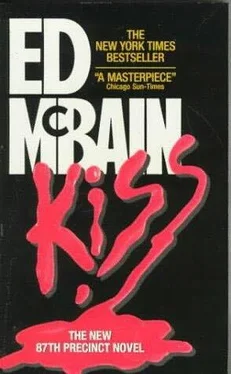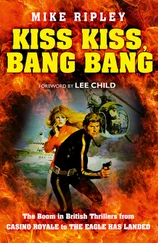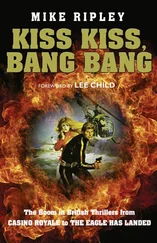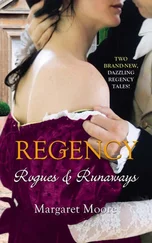"I didn't ask you when it was not in your possession. I asked you when it came into your possession. You're under oath, and you're a man of your word, so how about answering my question?”
"It came into my possession that very day.”
"August first last year?”
"Yes.”
"Have you ever fired this gun?”
"Never.”
"When you were arrested that night, did you turn this gun on Detectives Wade and Carella?”
"I turned to them. I didn't turn the gun on them.”
"But you had the gun in your hand, didn't you?”
"Yes.”
“So when you turned, the gun also turned, didn't it?”
"I suppose it did.”
"Were you planning to fire it?”
"No.”
"You just had it in your hand to ... well, why did you have it in your hand, Mr. Cole?”
"For self-defense.”
"Ah. Then you did intend firing it.”
"I'd already been shot, damn it!”
"Please answer the question. Did you intend firing that pistol at the arresting officers?”
"No, I did not.”
"Tell me, Mr. Cole, do you know how to use this gun?”
"I've seen guns like it.”
"Answer my question, please.”
"I could figure out how to use it if I had to.”
"Mr. Cole, do you or do you not know how to use this pistol? Please answer my question.”
"I do.”
"Even though you've never fired it?”
"Guns are pretty much all the same, one like the other.”
“No more questions," Lowell said.
Addison came back to his witness.
"Mr. Cole," he said, "I have only one other question." He lowered his voice. "Did you kill Anthony Carella?”
"I did not.”
"Thank you. I have no further questions. The defense rests its case, Your Honor.”
"I just want to clarify one point, Your Honor," Lowell said, and approached the witness stand again. "Mr. Cole, are you saying that before the night of August first you had never even held this pistol in your hand?”
"That's what I'm saying.”
"Thank you, I have nothing further.”
"All right then," Di Pasco said, "I'd like to recess till one o'clock this afternoon, at which time we'll hear your closing arguments. One o'clock suit everybody?”
"Yes, Your Honor.”
"Yes, Your Honor.”
"This court is recessed," Di Pasco said, and slammed down his gavel.
As Carella did every evening when he got home, he was now telling Teddy everything that had happened at the courthouse that day. Explaining trial procedure in sign language wasn't an easy task, but he went through it dutifully, augmenting his faltering fingers with speech so that she could read what he was talking about on his mouth as well.
He told her that the way a criminal trail ended was first the defense attorney made his closing argument and then the D.A. made his, after which the judge charged the jury, explaining the law to them and the possible verdicts they could reach in the case under consideration. It had taken Lowell an hour and a half to tell the jury what he had told Carella and his sister at the Golden Lion last Friday, before which Addison had taken a full two hours to tell them what a wonderful person of sterling character was his client Samson Wilbur Cole, who-as Addison had proved -was nowhere near the city on the night of the Carella murder, and moreover did not come into possession of the evidence pistol until two weeks after the murder was committed.
Di Pasco then told the jury that each witness's testimony should be weighed carefully and with the greatest solemnity as to the reliability and credibility of the witness, and urged them to put aside all thoughts of sentencing or sympathy, allowing only the evidence they had seen and heard to govern their verdict. He explained further that if they decided Samson Cole himself had not pulled the trigger on the night of the murder, but had in fact been acting in concert with another during the commission of a felony when the murder took place, then he was as guilty as whoever may have done the actual shooting, and should be found so by the jury. He reminded them again of the oaths they had taken as jurors, asked them to be fair-minded and open-minded in reaching their verdict and warned them again -as he had at the beginning of the trial-not to discuss the case with anyone but themselves while they were in deliberation. In conclusion, he wished them good luck in reaching a true verdict.
"Lowell said it may take a week, ten days," Carella said, signing, "or they might surprise everybody and decide earlier. He's known juries to come back in less than an hour.”
Teddy nodded, watching his fingers, alternately watching his lips. "But he said usually the longer a jury's out, the more likelihood there is of a compromise verdict.
There's no hard-and-fast rule, they can come back in ten minutes and say guilty, or they can come back next week and say not guilty, there's really no way to gauge it.”
How will you, she started to sign, but he anticipated what she was about to say, and overrode her flying fingers with his own, talking at the same time.
"He'll beep me when it looks close. The lieutenant has a car and driver standing by for me.
We'll ride the hammer all the way downtown.”
He was telling her they'd use the siren. She knew the expression. She nodded. Then, her face grave, she asked, What do you think the verdict will be?
"I don't know," he said.
They went to see Emma Bowles the very next morning.
She was just coming out of the building as they pulled up in the car. Wearing red tights, black leg warmers, black jogging shoes, a short black parka. No hat. Blonde hair glistening in the sunlight. It was one of those cold, clear, crisp days that made this city seem livable even in the wintertime, the sidewalks and streets spanking clean after yesterday's rain, all vestiges of sullied snow gone. The doorman outside started waving them off until Meyer lowered the visor to show a placard with the city's Police Department logo on it. He came over apologetically then, and asked if they'd move the car just a little bit up, away from the canopy and the front door. Meyer got out to run after Emma. Carella moved the car and then caught up with them.
She was walking very fast.
She explained that she went to aerobics three times a week, on Tuesday, Thursday, and Saturday, and walked on all the other mornings but Sunday, when even the Lord rested. She smiled when she said this, and then conversationally asked the detectives if they did much walking. Carella admitted that they didn't walk too often, except when they were tailing someone. Emma said they should both make sure they got plenty of exercise, it was paramount to one's health. That was exactly the word she used. Paramount. Both detectives were already out of breath, trying to keep up with her.
"What we wanted to tell you," Meyer said, "is that we've arrested the man who killed Tilly ...”
"Oh?”
"Yes. Got a signed confession from him, he was arraigned Monday morning.”
"That's wonderful," she said.
"It clears up a few questions, anyway. At least now we know your husband didn't have anything to do with Tilly's death.”
"The reason we're really here, though,”
Carella said, "is to tell you what progress we've made regarding this Denker person.”
"Denker?" she said.
"She doesn't know his real name, Steve,”
Meyer said.
She turned to look at Meyer on her left and then immediately turned to Carella, not missing a step, long legs reaching for pavement, fists pumping.
"The man your husband hired," Carella said.
"The so-called private eye.”
"But he is one," she said.
"Well, we don't think so, ma'am,”
Carella said. "The Chicago phone number he gave you is listed to someone named Andrew Denker, which we're assuming is his real name. We know he started shopping for a gun practically the minute he arrived here ...”
Читать дальше












